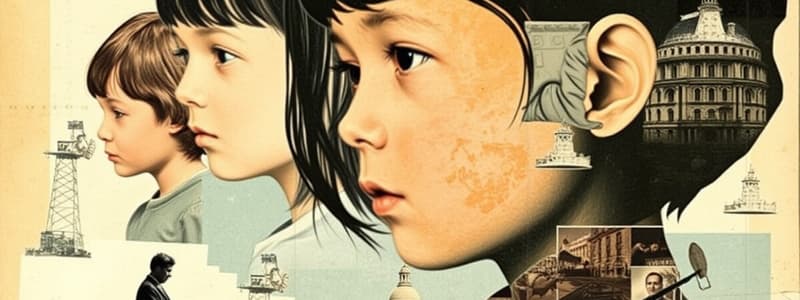Podcast
Questions and Answers
What is the psychosocial conflict during infancy?
What is the psychosocial conflict during infancy?
Trust vs. Mistrust
What is the outcome of positive resolution during toddlerhood?
What is the outcome of positive resolution during toddlerhood?
Independence and self-sufficiency
What is the psychosocial conflict faced in early childhood?
What is the psychosocial conflict faced in early childhood?
Initiative vs. Guilt
What is the psychosocial conflict in middle and late childhood?
What is the psychosocial conflict in middle and late childhood?
What is the outcome of negative resolution during adolescence?
What is the outcome of negative resolution during adolescence?
In young adulthood, the psychosocial conflict is ___ vs. Isolation.
In young adulthood, the psychosocial conflict is ___ vs. Isolation.
What leads to a sense of stagnation during middle adulthood?
What leads to a sense of stagnation during middle adulthood?
What is the psychosocial conflict during late adulthood?
What is the psychosocial conflict during late adulthood?
Flashcards are hidden until you start studying
Study Notes
Infancy (birth to 18 months)
- Trust vs. Mistrust is the primary psychosocial conflict.
- Positive resolution fosters reliance on caregivers, promoting predictability and environmental trust.
- Negative resolution results from neglect, leading to fear, anxiety, and mistrust.
Toddlerhood (18 months to 3 years)
- Autonomy vs. Doubt characterizes this stage.
- Positive resolution is encouraged by caregivers to promote independence and self-esteem.
- Negative resolution arises from restrictive caregiving, fostering self-doubt and low self-esteem.
Early Childhood (3 to 6 years)
- The central conflict is Initiative vs. Guilt.
- Positive resolution enables children to initiate activities, fostering social responsibility and self-confidence.
- Negative resolution stems from parental overcontrol, which suppresses spontaneity and promotes feelings of guilt.
Middle and Late Childhood (6 to 12 years)
- Industry vs. Inferiority is the focus of this developmental stage.
- Positive resolution develops pride and competence through peer experiences and parental support.
- Negative resolution can arise from negative interactions with parents or struggles with peers, leading to feelings of inadequacy.
Adolescence
- The critical conflict is Identity vs. Identity Diffusion.
- Positive resolution occurs through role experimentation, leading to a stable self-definition and future commitments.
- Negative resolution results in confusion about identity due to external pressures or apathetic attitudes.
Young Adulthood
- Intimacy vs. Isolation is the psychosocial challenge faced.
- Positive resolution involves forming meaningful relationships, fostering connectedness and intimacy.
- Negative resolution arises from fear of rejection, which can lead to psychological isolation.
Middle Adulthood
- The conflict is Generativity vs. Stagnation.
- Positive resolution is achieved by contributing to the next generation through caring and community involvement.
- Negative resolution involves self-absorption, resulting in feelings of stagnation and lack of meaningful achievements.
Late Adulthood
- Ego Integrity vs. Despair is the final psychosocial conflict.
- Positive resolution brings self-acceptance and a sense of accomplishment in reviewing one's life.
- Negative resolution leads to regret and dissatisfaction when reflecting on life and achievements.
Studying That Suits You
Use AI to generate personalized quizzes and flashcards to suit your learning preferences.




